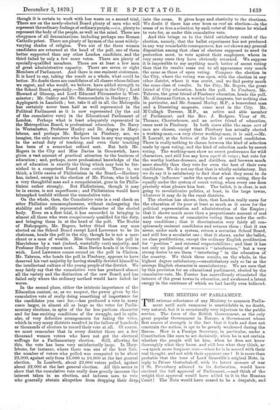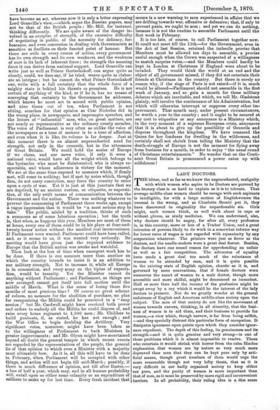THE MEETING OF PARLIAMENT.
THE extreme reluctance of any Ministry to summon Parlia- ment until such summons is unavoidable is, no doubt, very natural, but it is occasionally very injurious to the public service. The force of the British Government, as the only great popular Government in Europe, a Government whose first source of strength is the fact that it leads and does not constrain the nation, is apt to be greatly weakened during the Recess. How is a Foreign Secretary, in particular, under a Constitution like ours to act decisively, when he is not certain whether the people will let him, when he does not know thoroughly what they know, and still less what they think, or —a much more frequent case—when he is in accord with their real thought, and not with their apparent one ? It is more than probable that the tone of Lord Granville's original Note, in reply to Prince Gortschakoff, with its latent menace of war if St. Petersburg adhered to its declaration, would have received the full approval of Parliament,—and think of the weight that approval would have added to it in the Russian Court! The Note would have ceased to be a despatch, and
have become an act, whereas now it is only a letter expressing Lord Granville's view,—which, argue the Russian papers, may not be that of the British people ; Mr. Mill, for instance, thinking differently. We are quite aware of the danger in- volved in an overplus of strength, of the excessive difficulty of negotiating in public, of the necessity for delicacy, for- bearance, and even concession in dealing with Governments as sensitive as duellists on their fancied point of honour. But there are evils in every course of action, every government has its own strength and its own weakness, and the weakness of ours is its lack of inherent force ; its strength the amazing force it can derive from national support. Lord Granville can write just as well as Prince Gortschakoff, can argue quite as closely, could, we dare say, if he tried, weave quite as elabor- ate an intrigue ; but he cannot do what Prince Gortschakoff can, write with a full certainty that the whole force of a mighty state is behind his threats or promises. He is not certain of anything of the kind, or if he is, has no means of conveying that certainty to the Government he addresses, which knows he must act in accord with public opinion, and nine times out of ten, when Parliament is not sitting, searches for that opinion as Czar Nicholas did in the wrong place, in newspapers, and impromptu speeches, and the letters of " influential " men, who, on great matters, are not nearly so representative as the ordinary county member. The voice of Parliament is very often as unlike the voice of the newspapers as a tone of menace is to a tone of affection, and even when it is like, its volume is far deeper. Just at this moment there is an almost unprecedented need for strength, not only in the counsels, but in the utterances of Great Britain. We could hold the scales of Europe if we chose, and our mere voice, if only it were a national voice, would have all the weight which belongs to the bystander who must be disinterested, who is always re- spectable, and whose adherence is victory for the moment. We are at the same time exposed to menaces which, if firmly met, will come to nothing; but if met by notes which, though firm, do not carry conviction, may force the country to enter upon a cycle of war. Yet it is just at this juncture that we are deprived, by an ancient custom, or etiquette, or supersti- tion, of the only swift means of communication between the Government and the nation. There was nothing whatever to prevent the summoning of Parliament three weeks ago, except a vague impression that it would be "a most serious step to take." The public, misled by a tradition, thinks of sach a summons as of some laborious operation ; but the truth is, that when, as happens this year, Members are most of them at home, every one of them could be in his place at four-and- twenty hours' notice without the smallest real inconvenience. If Parliament were wanted, Parliament could have been called, and, as it seems to us, it was wanted very seriously. Its meeting would have given just the required evidence to Europe that the British nation was awake and watchful. Then look at the loss of time when emergent work has to be done. If there is one measure more than another on which the country intends to insist it is an addition to our military strength. Not to increase it, while all Europe is in commotion, and every army on the tiptoe of expecta- tion, would be insanity. Yet the Minister cannot do anything without Parliament ; and Parliament, as things are now arranged, cannot get itself into fall motion until the middle of March. What is the sense of losing those five months of most precious time ? Of course no great scheme of reform, no measure for the abolition of purchase, no plan for reorganizing the Militia could be presented in a "snap session ;" but Mr. Cardwell might have received both power and orders to embody all the Militia he could dispose of, and raise every home regiment to 1,500 men ; Mr. Childers to build gunboats, if, as stated, he has not enough ; and the War Office to begin doubling the Artillery. Very significant votes, moreover, might have been taken as to the willingness of Parliament to back Ministers in greater improvements ; and Mr. Glynn might have ascertained beyond all doubt the general temper in which recent events are regarded by the representatives of the people, the general lie of that opinion to which even a Minister with a majority must ultimately bow. As it is, all this will have to be done in February, when Parliament will be occupied with other things, and action will not begin till mid-March ; possibly, if there is much difference of opinion, not till after Easter,--a loss of half a year, which may, and in all human probability will, entail upon us either some calamity or an expenditure of millions to make up for lost time. Every fresh incident that occurs is a new warning to men experienced in affairs that we are drifting towards war, offensive or defensive; that, if only to prevent panic, we ought to arm ; and yet we can do nothing, because it is not the routine to assemble Parliament until the first week in February.
It is too late, of course, to call Parliament together now. It could not meet till the 15th—for the Government, even in the Act of last Session, retained the imbecile proviso that Members must be allowed ten days to assemble, a proviso useful enough when the Crown was suspected of a willingness to snatch surprise votes,—and the Members could hardly be kept in London at Christmas if England were about to be invaded. They would think the world at an end and the object of all government missed, if they did not entertain their friends at Christmas in the country. But there is surely no reason why, if the siege of Paris is not raised—if it is, much would be altered—Parliament should not assemble in the first week of January, and so gain a month for those military debates which are inevitable, and which, we tell Mr. Gladstone plainly, will involve the continuance of his Administration, but which will otherwise interrupt or suppress every other im- provement. That month may, under present circumstances, be worth a year to the country ; and it ought to be secured at any cost to etiquettes or any annoyance to a Ministry which, in the very moment of a supreme European crisis, announces that it is about to give up the possibility of Councils and disperse throughout the kingdom. We have censured the Queen for her fondness for dwelling in the wilderness, and certainly shall not shrink from telling the Ministry that the death-struggle of Europe is not the moment for flying away from business for a month, in order to enjoy "the usual round of Christmas entertainments." No wonder that on the Conti- nent Great Britain is pronounced a power eaten up with selfishness



































 Previous page
Previous page